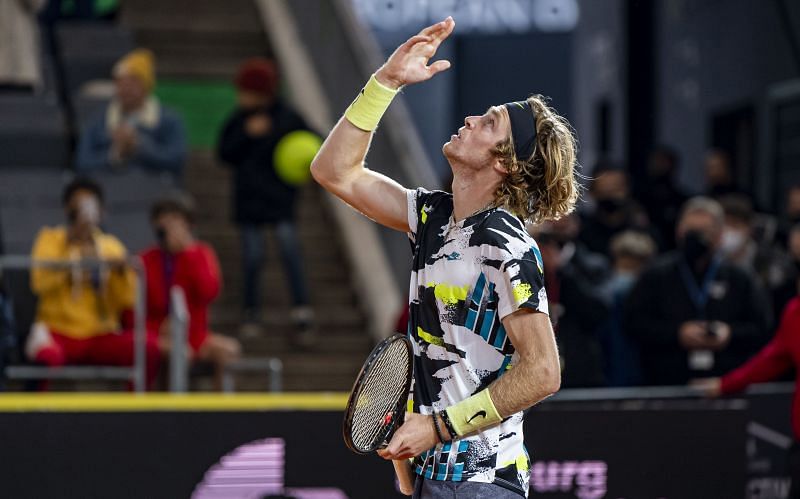
Andrey Rublev's stunning turnaround: Is the Russian punching above his weight, or is he the real deal?
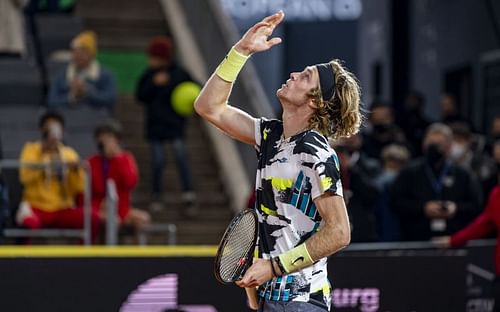
Slowly but surely men's tennis is heading towards a change of guard, from its evergreen 'Holy Triad' to the consistently blooming NextGen. Yes, the Majors are still being dominated by Novak Djokovic and Rafael Nadal, and Roger Federer could well pull off another miracle (circa 2017) when he comes back. But the younger guys are knocking on the door louder than ever.
Most recently, men's tennis got a first Grand Slam champion born in the 1990s in Dominic Thiem. Daniil Medvedev and Alexander Zverev have also been just a hair's breadth away from tasting gold. And Stefanos Tsitsipas once again made a solid impression at Roland Garros, with a spirited fight against Djokovic.
But among these high-profile, flashy names, there is one that has quietly flown under the radar. That name is Andrey Rublev, the most consistent player of the year next to a certain Novak Djokovic.
The evolution of Andrey Rublev
The 22-year-old Rublev has won a whopping four titles this year, the latest of which came on Sunday at St. Petersburg. But he didn't just burst on to the scene out of the blue in 2020; the Russian was actually one of the hottest properties in the world as a junior, winning the 2014 French Open boys' singles title.
In fact, Andrey Rublev was the earliest among his peers to reach a Grand Slam quarterfinal, doing so at the 2017 US Open aged just 19. But things started going south for the young lad soon after that, as a back injury forced him to skip the French Open and Wimbledon in 2018.
When he returned, his peers had left him far behind. Alexander Zverev had added a couple more Masters titles to his kitty, Daniil Medvedev had won three titles and was about to have a Texas-sized 2019, and Stefanos Tsitsipas had reached a Masters final (beating Novak Djokovic) and registered a path-breaking win over Roger Federer at the Australian Open.
Among all those stellar achievements, Rublev was quickly forgotten. A couple of opening round exits at the Slams, and another missed French Open, didn't help his cause either. But the soft-spoken Russian quietly kept working on his game throughout 2019.
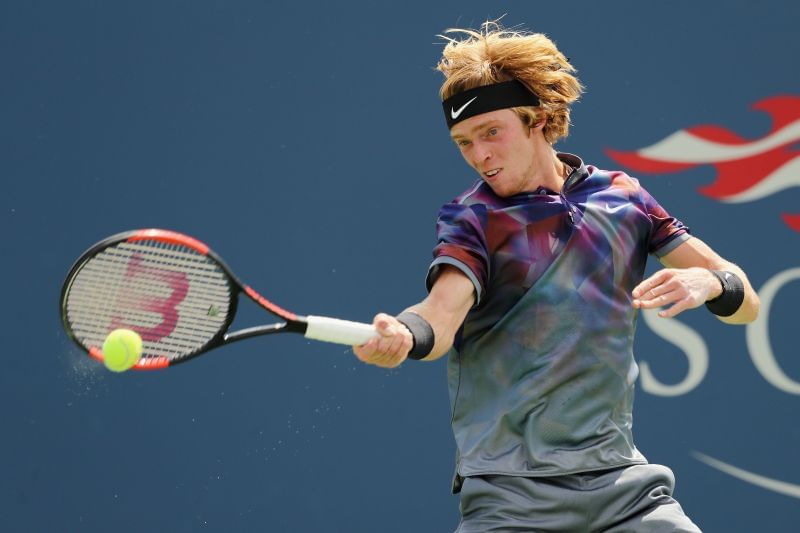
His efforts started paying dividends in the latter half of last year. He had his biggest career win over Roger Federer in Cincinnati, before going on to beat Stefanos Tsitsipas and Nick Kyrgios at the US Open.
Rublev ended his year on a high by winning the ATP Kremlin Cup. And that was a sign of things to come.
Since last October Andrey Rublev has won five ATP Titles, with his last two coming at ATP 500 events. He has registered some statement wins in the process too, over the likes of Tsitsipas, Roberto Bautista Agut, Casper Ruud, Denis Shapovalov and Borna Coric.
The Russian has reached two Grand Slam quarterfinals in that span and made his debut in the top 10, while also gaining a strong foothold in the Race to London ranking.
But more than his results, it is the improvement in his game that is earning him praise from all corners. The big-hitting Russian has seemingly been improving with every match he has been playing; he is showing a penchant for hard work and dedication that is rare to find among most from his generation.
Shoring up every aspect of his game one by one
Andrey Rublev's forehand has always been seen as a big weapon. His ability to consistently hit deep off that wing and finish points with the huge inside-out bullet always seemed destined to keep him somewhere near the top.
But the other parts of his game seemed to lack substance. And those ancillary aspects are usually the difference between being one of the top players and the cream of the crop.
The Russian has, however, worked relentlessly towards adding those missing elements to his game. Rublev is no more clueless the moment you hit to his backhand side. He is now hitting much deeper and heavier off that wing, especially down the line; the Rublev backhand is not just a rally shot anymore.
Rublev has also started getting a lot more cheap points when he needs them. His first serve is now one of his biggest weapons, helping him coast through service games almost like a bot. And the second serve weakness, while still a concern, seems to be gradually fading too.
During his recent title run in St. Petersburg, Rublev also showed immense confidence at taking the ball out of the air and finishing points with big drive volleys. The net game is a work in progress, but at least he's showing an inclination to move forward now.
That's not all. Andrey Rublev has also largely improved the physical aspects of his game along with his technical ability. The 22-year-old now has much better footwork and a stronger overall physique; he has rarely shown signs of fatigue despite playing almost non-stop since the end of the COVID break.
The young Russian is still suspect to mental lapses, often getting frustrated when he misses makeable shots. But even in that area he has taken a big leap from his junior days.
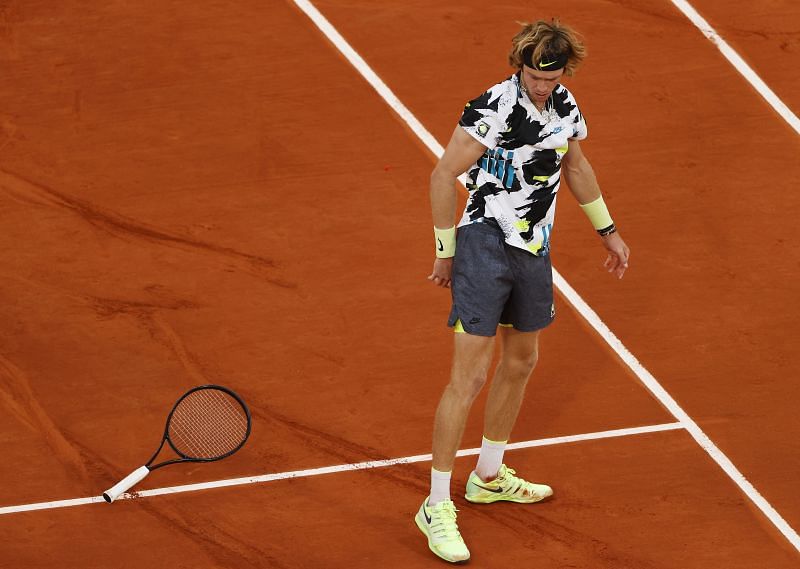
However, the evolution isn't complete yet. Andrey Rublev now needs to concentrate on developing a stronger big-match mentality, as well as adding more variety to his game. The serve and groundstrokes can help him dominate the players at or below his level, but against higher-ranked opponents on the biggest of stages, he will need more.
The Russian resorts to the backhand slice only when forced to, and almost never uses it aggressively to work his way out of a long rally. He also struggles while defending against the opponent's slice, as seen during both the US Open and the Roland Garros quarterfinals.
In those two beatdowns at the hands of his NextGen colleagues, it was clear just how much Rublev lets even a minor blip affect him mentally.
Against compatriot Daniil Medvedev in New York, Rublev was never the same player after missing three set points in the first set. And against Stefanos Tsitsipas in Paris, the Russian dominated the first set before being broken while serving for the lead and then collapsing in straight sets.
Rublev still runs out of options when a rally against a shot-tolerant opponent is stretched beyond 7-8 shots. And that is because, even with everything he has added to his game, he still lacks options in comparison to the rest of the Next Gen players.
It is absolutely essential for Andrey Rublev to develop a slice, and also to learn to play against the slice. Rublev could also take a leaf out of his idol Rafael Nadal's book and recognize that it's not necessary to always hit the ball hard; sometimes, it is alright to just loop it back in the court.
Once Andrey Rublev does add these elements to his game, he can dream of bigger things and pose more of a challenge in the deeper stages of Grand Slams. He's made at least the fourth round at all the Majors this year, and the quarterfinals of the last two; he should now be looking to take the logical next step and make a semifinal soon.
Andrey Rublev, forever the underdog?
Despite having a stunning win-loss ratio of 84.44% in 2020 (second only to Novak Djokovic), Andrey Rublev still doesn't seem to have got out of the shadows. In fact, Rublev is the only player in the current top 15 without a racket sponsor; he plays with a blacked-out racket.
That could be down to the fact that the Russian is yet to produce an iconic performance at the Grand Slams against the Big 3, something that most of his peers have done. It could also perhaps be due to the lack of variety in the Russian's seemingly limited game, which has made pundits wonder whether he has a ceiling.
Or it could simply be because Rublev lacks the flashy personality of a superstar.
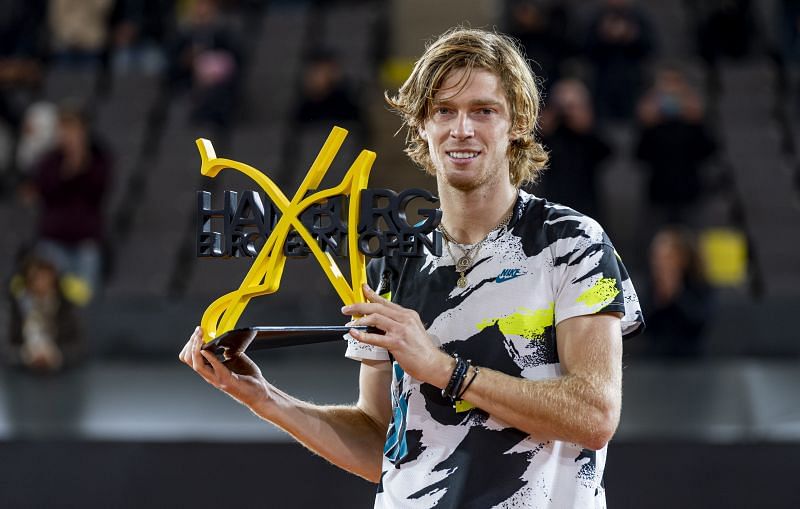
Andrey Rublev always sports a no-nonsense demeanor; one look at him either on the court or off it, and you know he means business. The Russian doesn't try to be cute with drop shots or fancy tricks, and he seemingly has no time for niceties.
Like Dominic Thiem, Rublev will perhaps always be chided for being a 'ball-basher'. But that didn't stop Thiem from achieving success, so why should it stop Rublev?
The Austrian gradually added variety to his game over the years, and he is now a Grand Slam champion. There's no reason why Rublev can't emulate or even surpass Thiem's success.
Andrey Rublev doesn't have as much of an 'ooh-aah' factor to his game as Denis Shapovalov or Stefanos Tsitsipas. He lacks the solidity of the much younger Jannik Sinner, and the explosiveness of the (admittedly erratic) Felix Auger-Aliassime. The Russian also cuts a shy figure off the court, and doesn't possess the charisma of Alexander Zverev or the outspoken charm of Daniil Medvedev.
But the one thing that Andrey Rublev has, perhaps more than any other young player, is the right attitude. His desire to always keep improving, to keep working hard, to keep trying to live up to his own sky-high expectations, has helped him go from a sometimes-forgotten Next Gen talent to the most consistent Next Gen player of all.
As they say, sometimes the right attitude is all you need.